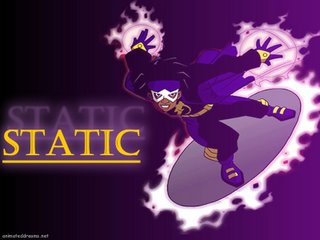
"A gentleman at a local bookstore explained nesting grounds as the nourishment you find when you are surrounded by nutrients that feed the mind. Educators must give poor African American students who struggle with reading the nourishment that feeds the mind and provide them with the sustenance to enter a different world from the one in which they were born".
Alfred W. Tatum author of
Teaching Reading to Black Adolescent Males: Closing the Achievement Gap
This year will be a banner one for diversity in the $500 million comic book business. At DC Comics, an effort is under way to introduce heroes who are not cut from the usual straight white male supercloth. A mix of new concepts, dusted-off code names and existing characters, the new heroes include Blue Beetle, a Mexican teenager powered by a mystical scarab; Batwoman, a lesbian socialite by night and a crime fighter by later in the night; and the Great Ten, a government-sponsored Chinese team.
Over at Marvel Comics, Black Panther, king of the fictional African nation of Wakanda, will soon marry Storm, the weather-controlling mutant and member of the X-Men. Luke Cage, a strong-as-steel black street fighter who married his white girlfriend in April, plays a key role in "New Avengers," the company's best-selling book.
Comic books have featured minorities before, but the latest push is intended to be a sustained one, taking place in an alternate world that nevertheless reflects American society in general and comics readers in particular, in much the same way that the multicultural casts of television shows like ABC's "Lost" and "Grey's Anatomy" mirror their audiences. "I'm glad we're at the point when they're being rolled out without flourish - not 'Minority Heroes Attack!,' " said Judd Winick, who has written many comics for both Marvel and DC. "It's important just to see them as characters and not a story line about race."
Credit is due in part to diversity behind the scenes. Reginald Hudlin, Black Entertainment Television's president for entertainment, is writing the Black Panther series.
Joe Quesada is editor in chief at Marvel, the first Hispanic to have that job. "I do look at the universe with a different set of eyes," Quesada said, "but I don't let race enter or interfere with the story. There's nothing worse than thinking, 'We need three more black characters in the Marvel universe.' "
In the DC universe, many of the heroes are closely tied to "52," an ambitious, year-long series, published weekly, that began this month. With the established heroes Batman, Superman and Wonder Woman mainly offstage trying to find themselves after a strained alliance in "Infinite Crisis," the events of "52" force the new heroes into bigger roles.
"We're trying a lot at the same time," said Dan DiDio, DC's vice president and executive editor, "but we don't know how it's going to be accepted."
In 1993 DC printed and distributed the work of Milestone Media, an African-American-owned company specializing in comics with black, Asian, Hispanic and gay heroes. Some of the titles ran for nearly four years, but all ceased publication during a volatile time in the comic industry. One character, a black teenager with electrical powers, found greater success in the animated series "Static Shock."

No comments:
Post a Comment